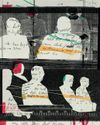
Nine months into the pandemic, Nick Thompson, a marketer at a tech firm in Chicago, got a message on LinkedIn inviting him to apply to be a contestant on a Netflix reality show called “Love Is Blind.” Thompson, a Midwesterner with bright-blue eyes and a sheepish smile, didn’t watch much reality TV, although he’d caught a bit of “The Bachelor” so that he could join a betting bracket at his office. He was more of a fan of W.W.E. wrestling, so much so that he’d once trained to become a wrestler himself. “For, like, a day,” he said, laughing—he’d busted his ankle, then quit.
The format of “Love Is Blind” sounded outlandish: fifteen men and fifteen women were gathered in Los Angeles, where they were ensconced in individual “pods” and flirted with strangers through a wall. After just a few days of speed courtship, contestants fell in love and, amazingly, some got engaged, sight unseen. The show’s producers, who worked for a company called Kinetic Content, emphasized that “Love Is Blind,” despite its premise, wasn’t some sleazy guilty pleasure like “Temptation Island.” It was a sincere experiment in human intimacy—participants were placed on a “digital fast” designed to liberate them from all distractions, including physical appearance, so that they could form a deeper, more lasting bond with a partner. The producers weren’t looking for clout-chasers but for emotionally mature adults, people who were ready to commit to marriage, for real.
This story is from the May 27, 2024 edition of The New Yorker.
Start your 7-day Magzter GOLD free trial to access thousands of curated premium stories, and 9,000+ magazines and newspapers.
Already a subscriber ? Sign In
This story is from the May 27, 2024 edition of The New Yorker.
Start your 7-day Magzter GOLD free trial to access thousands of curated premium stories, and 9,000+ magazines and newspapers.
Already a subscriber? Sign In

GET IT TOGETHER
In the beginning was the mob, and the mob was bad. In Gibbon’s 1776 “Decline and Fall of the Roman Empire,” the Roman mob makes regular appearances, usually at the instigation of a demagogue, loudly demanding to be placated with free food and entertainment (“bread and circuses”), and, though they don’t get to rule, they sometimes get to choose who will.

GAINING CONTROL
The frenemies who fought to bring contraception to this country.

REBELS WITH A CAUSE
In the new FX/Hulu series “Say Nothing,” life as an armed revolutionary during the Troubles has—at least at first—an air of glamour.

AGAINST THE CURRENT
\"Give Me Carmelita Tropicana!,\" at Soho Rep, and \"Gatz,\" at the Public.

METAMORPHOSIS
The director Marielle Heller explores the feral side of child rearing.

THE BIG SPIN
A district attorney's office investigates how its prosecutors picked death-penalty juries.

THIS ELECTION JUST PROVES WHAT I ALREADY BELIEVED
I hate to say I told you so, but here we are. Kamala Harris’s loss will go down in history as a catastrophe that could have easily been avoided if more people had thought whatever I happen to think.

HOLD YOUR TONGUE
Can the world's most populous country protect its languages?

A LONG WAY HOME
Ordinarily, I hate staying at someone's house, but when Hugh and I visited his friend Mary in Maine we had no other choice.

YULE RULES
“Christmas Eve in Miller’s Point.”